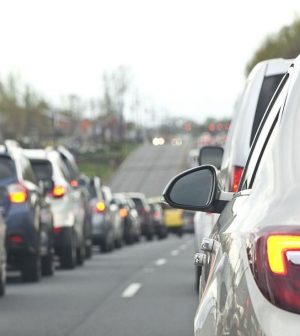- Could Your Grocery Store Meat Be Causing Recurring UTIs?
- Are You Making This Expensive Thermostat Error This Winter?
- Recognizing the Signs of Hypothyroidism
- 10 Strategies to Overcome Insomnia
- Could Artificial Sweeteners Be Aging the Brain Faster?
- Techniques for Soothing Your Nervous System
- Does the Water in Your House Smell Funny? Here’s Why
- Can a Daily Dose of Apple Cider Vinegar Actually Aid Weight Loss?
- 6 Health Beverages That Can Actually Spike Your Blood Sugar
- Treatment Options for Social Anxiety Disorder
Living Near Noisy Roads Can Raise Your Blood Pressure

That road noise outside your window could be wreaking havoc on your blood pressure.
A new study published March 22 in JACC: Advances found that the roaring engines, blaring horns and wailing sirens can themselves elevate high blood pressure (hypertension) risk, aside from questions about the impact of air pollution.
“We were a little surprised that the association between road traffic noise and hypertension was robust even after adjustment for air pollution,” lead author Jing Huang said in a journal news release. She is an assistant professor in the School of Public Health at Peking University in Beijing.
To study this, Huang and her colleagues analyzed data from more than 240,000 people in the UK Biobank. They were 40 to 69 years of age and did not have high blood pressure when the study began.
Road traffic noise estimates were based on residential addresses and a European noise assessment tool.
Using data over a median of about eight years, researchers found that participants who lived near road traffic noise were more likely to develop high blood pressure and that their risk rose as noise increased.
The finding held even after researchers adjusted for exposure to fine particles and nitrogen dioxide in the air.
People who had high exposure to both traffic noise and air pollution had the highest risk for high blood pressure.
“Road traffic noise and traffic-related air pollution coexist around us,” Huang said. “It is essential to explore the independent effects of road traffic noise, rather than the total environment.”
Huang said the findings are enough to support public health measures to lower the adverse impact of road traffic noise. This could include stricter noise guidelines and enforcement, improving road conditions and urban design and investing advanced technology on quieter vehicles.
“To date, this is the first large-sized prospective study directly addressing the effect of road traffic noise on the incidence of newly-diagnosed hypertension,” said Dr. Jiandong Zhang, a cardiology fellow at the University of North Carolina at Chapel Hill. He wrote an editorial that was published with the findings.
“The data demonstrated in this article provides a higher quality of evidence to justify the potential to modify road traffic noise and air pollution from both individual and societal levels in improving cardiovascular health,” Zhang said in the release.
Researchers are now doing field studies to better understand how road noise affects blood pressure.
More information
The U.S. Centers for Disease Control and Prevention has more on high blood pressure.
SOURCE: American College of Cardiology, news release, March 22, 2023
Source: HealthDay
Copyright © 2026 HealthDay. All rights reserved.










